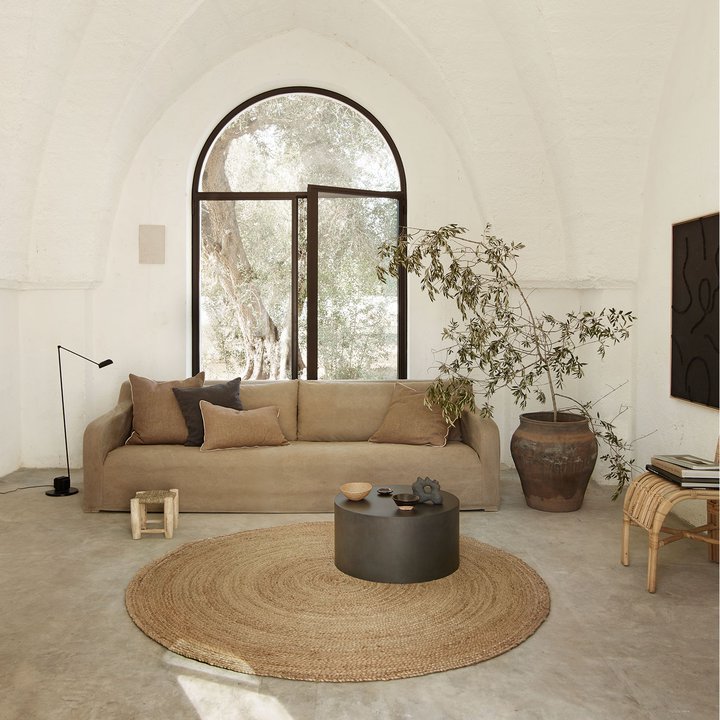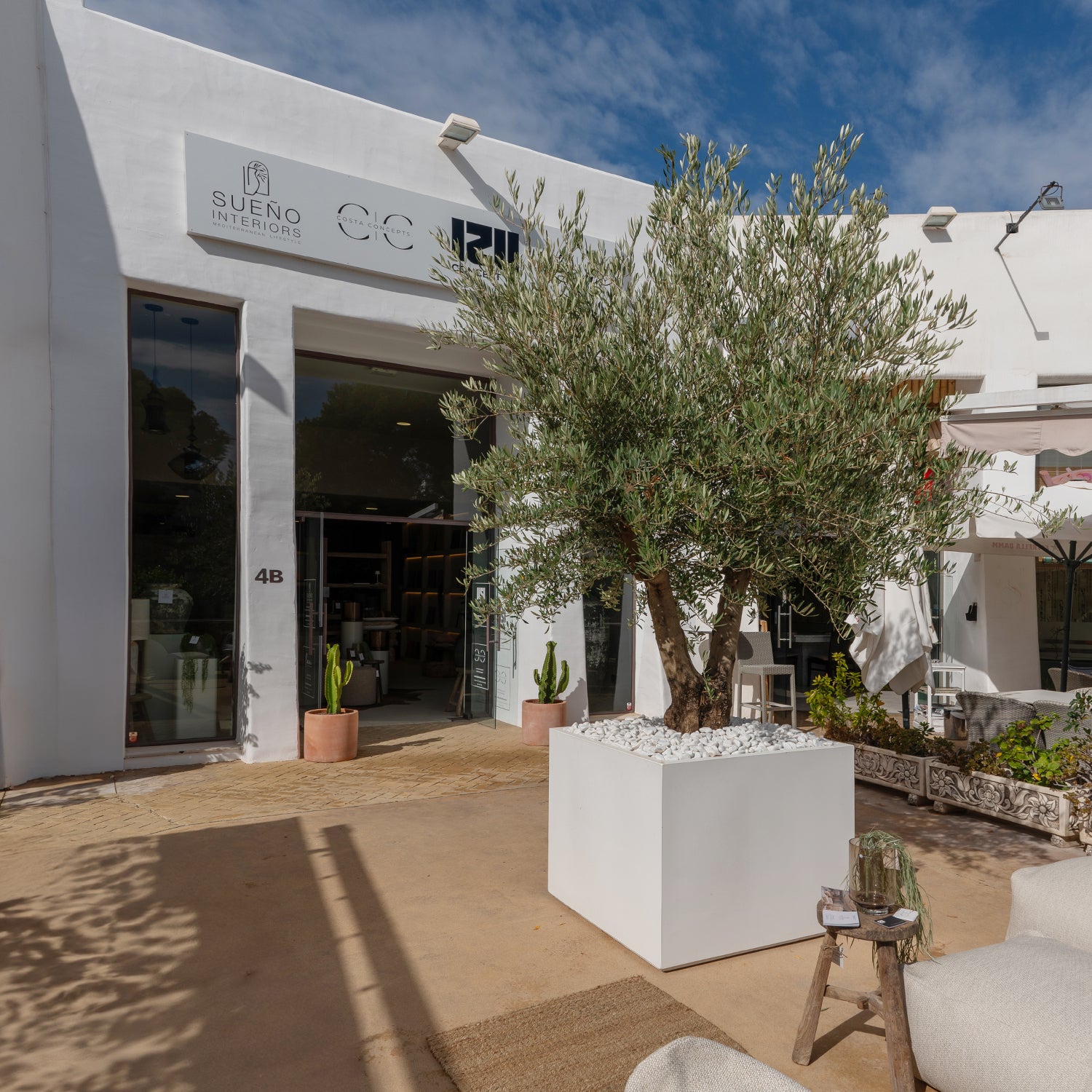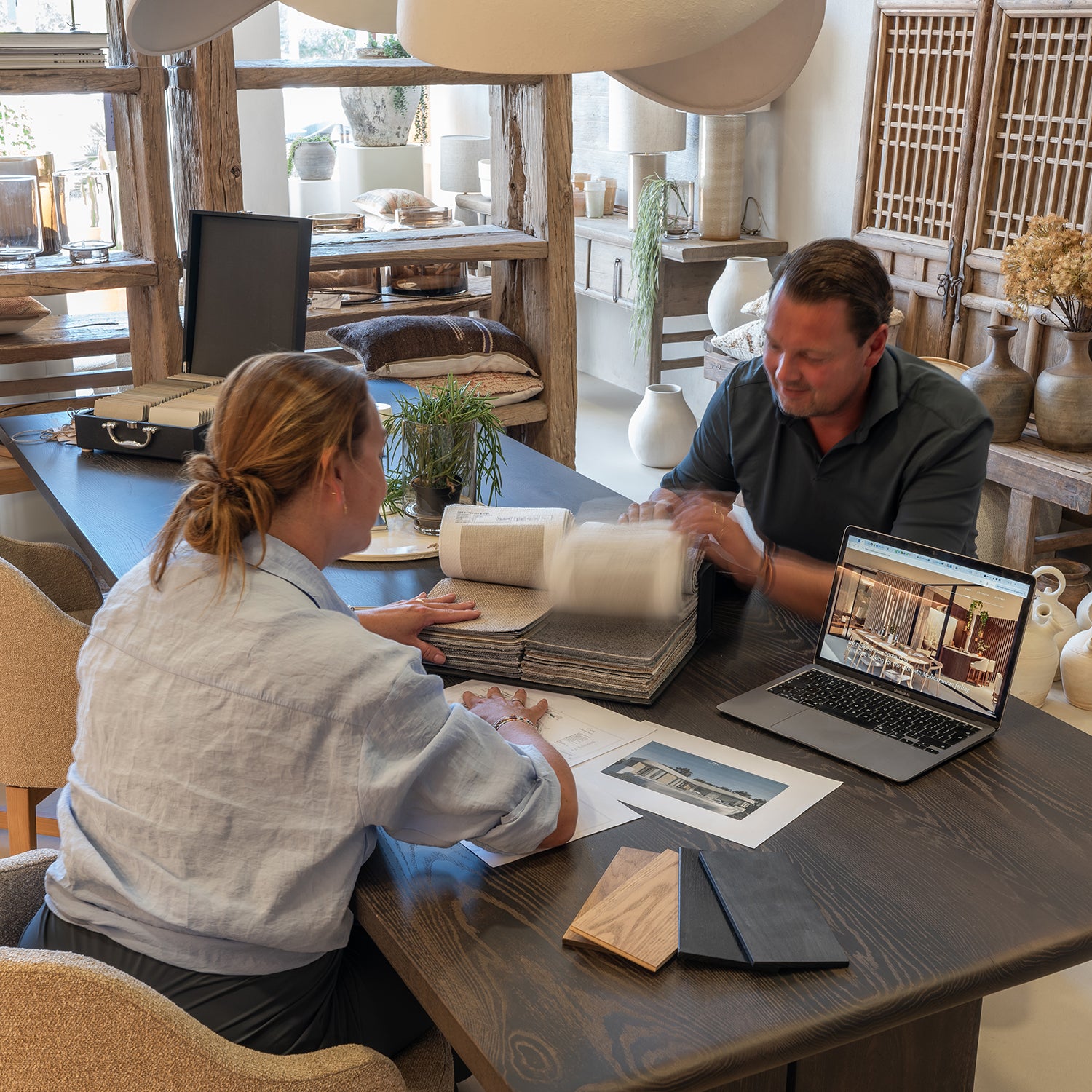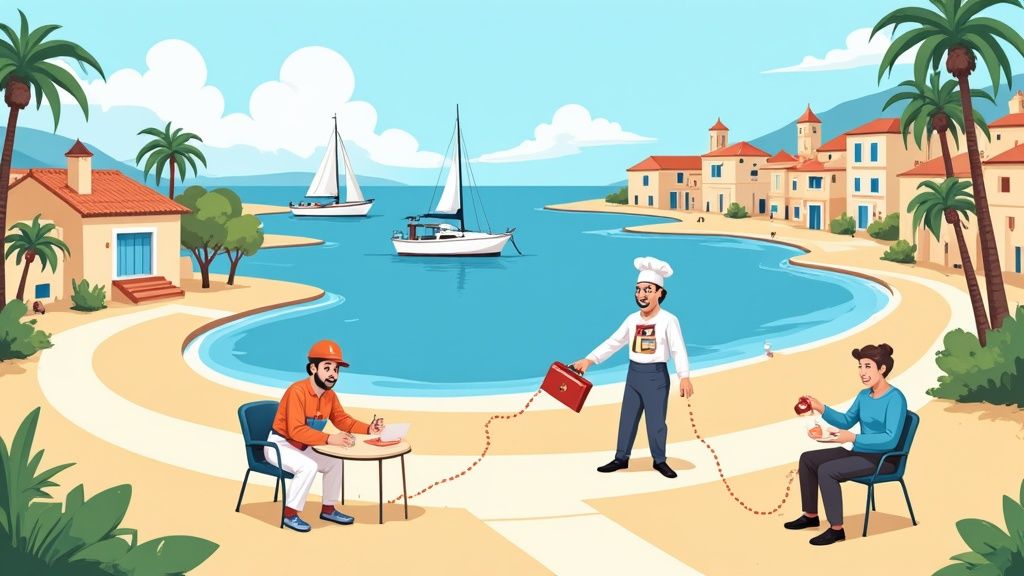
Jobs in Javea Spain: Your Practical Guide to Landing Opportunities
Finding a job in Jávea isn't like hunting for one in a major city. Forget corporate ladders and sprawling business parks. Here, the market moves to the rhythm of the sun, tourism, and a vibrant international community. The real opportunities are found in hospitality, real estate, and skilled trades, with a noticeable surge in demand from spring right through to autumn. Understanding this unique coastal economy is your first step to landing a role on the Costa Blanca.
Decoding Jávea's Unique Job Market
Before you start polishing your CV, it's crucial to get a feel for what makes Jávea tick. This isn't a place dominated by large corporations; it's a dynamic town where the economy is fuelled by tourism, services for a huge expat population, and local businesses. Think less about climbing a corporate ladder and more about finding your niche within a tight-knit, community-focused environment.
When you grasp this, you can start to see where your own skills fit into what local businesses genuinely need. A quick, honest look at the main industries reveals where the tangible opportunities are waiting.
The Pillars of Jávea's Economy
The local job market really stands on three main pillars, each with its own pace and demands. Hospitality is the most obvious one, absolutely booming during the summer months. Restaurants, beach bars (chiringuitos), and hotels all need to staff up to handle the wave of tourists. Roles can be anything from waiting staff and chefs to hotel management, making it a brilliant way to get your foot in the door.
Away from the seasonal hustle, the property and real estate sector offers more stable, year-round work. This industry is all about catering to the large number of expats and holiday-home owners. There’s a constant need for sales agents, property managers, and maintenance staff to help manage, sell, and look after these homes. It's a common story: people visit, fall in love with the place, and decide to stay. If that sounds familiar, you might find our guide on buying a holiday home in Jávea an interesting read.
This quick overview gives you a snapshot of Jávea's key employment areas.
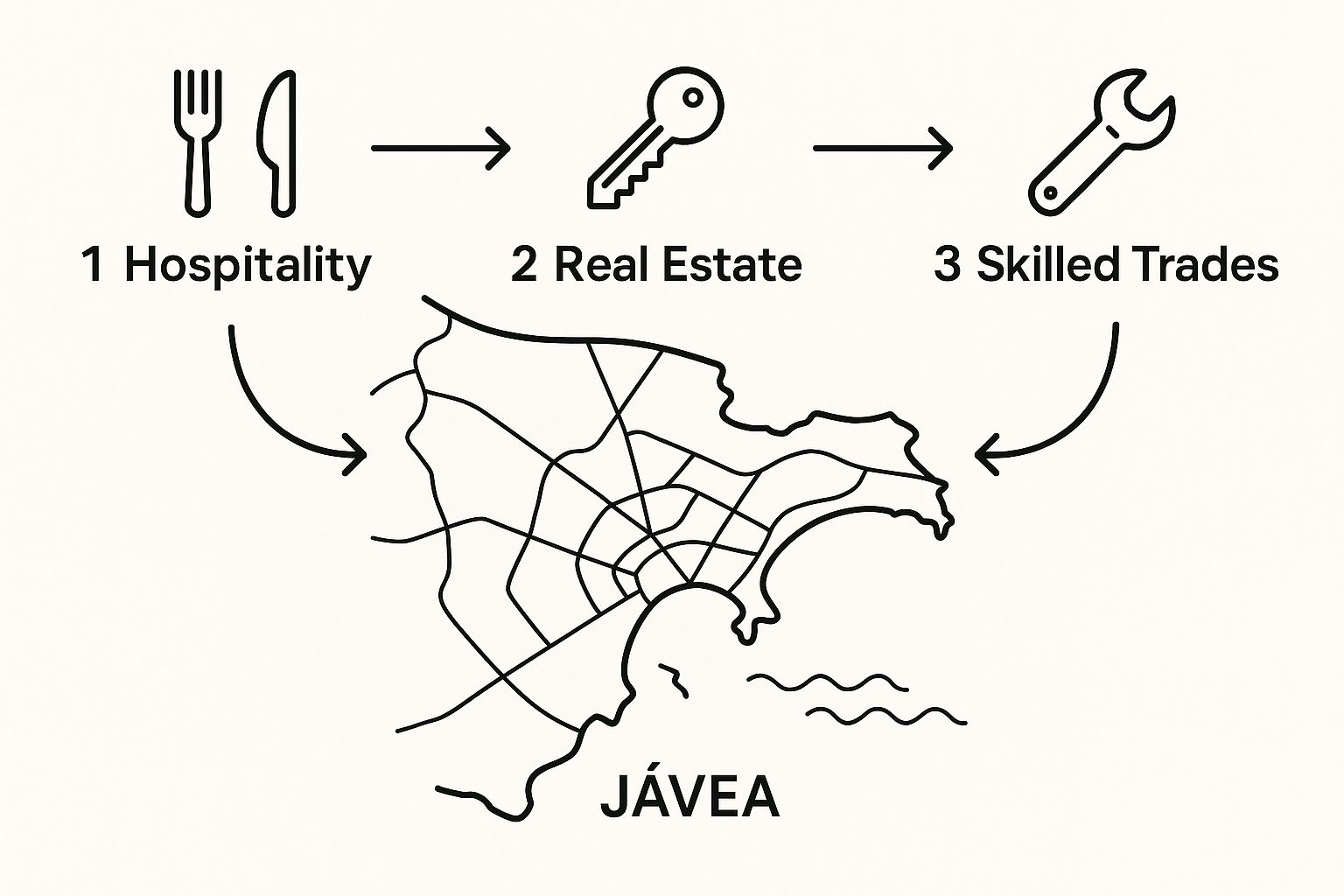
As you can see, hospitality, real estate, and the trades are the bedrock of the local economy. Below is a more detailed breakdown to help you see where you might fit in.
Jávea's Key Employment Sectors at a Glance
This table provides a quick look at Jávea's main industries, the kinds of jobs available, and what to expect in terms of seasonality and language skills.
| Sector | Common Job Roles | Typical Seasonality | Language Requirements |
|---|---|---|---|
| Hospitality & Tourism | Waiter/Waitress, Chef, Bartender, Hotel Staff, Tour Guide | Highly seasonal (April-October peak) | English is often key; Spanish is a huge plus |
| Real Estate & Property | Sales Agent, Property Manager, Maintenance, Cleaner | Year-round, with peaks in buying seasons (spring/autumn) | Multilingual skills (English, Spanish, German, etc.) are highly valued |
| Skilled Trades | Electrician, Plumber, Builder, Gardener, Pool Maintenance | Consistent year-round demand | Basic to conversational Spanish is usually necessary for suppliers/clients |
| Retail & Services | Shop Assistant, Supermarket Staff, Wellness Professional | Mix of seasonal and year-round roles | Conversational Spanish is often required to serve a diverse customer base |
Understanding these nuances will help you target your job search far more effectively, focusing on sectors that not only need your skills but are also hiring when you're looking.
The Unseen Engine: Skilled Trades and Retail
It’s easy to overlook, but the skilled trades are a critical part of Jávea's economy. With a steady flow of new residents and endless property renovations, there is a constant, year-round demand for qualified electricians, plumbers, builders, and gardeners. These jobs aren't as tied to the tourist season and often pay well, particularly if you build a solid reputation. If you've got a trade, you have an incredibly valuable skill here.
Finally, the retail sector serves both the holidaymakers and the permanent international community. You’ll find jobs in boutiques, supermarkets, and specialty shops, but most will require at least basic Spanish to handle the diverse customer base. Knowing this landscape is the key to your success. After all, the national employment rate in Spain for people aged 15 to 64 had climbed to 66.5% by the first quarter of 2025, reflecting a steady recovery. While that's a positive sign, local markets like Jávea always have their own unique rhythm.
Getting Your Spanish Paperwork in Order
Before you even start polishing your CV, let's talk about the biggest hurdle: getting your legal status sorted. The Spanish system can feel like a labyrinth of acronyms and endless appointments, but a little know-how makes all the difference. Your path is entirely dependent on your passport, so figuring out which route you need to take is step one.
For citizens of the EU, EEA, or Switzerland, the process is thankfully straightforward. Thanks to freedom of movement, you don't need a work visa to look for jobs in Jávea, Spain. However, if you're planning on staying longer than three months, you'll need to register as a resident.
This means getting your hands on the all-important NIE number (Número de Identificación de Extranjero). This is your unique tax identification number, and you’ll need it for just about everything—signing a work contract, opening a bank account, even getting your Wi-Fi set up.
The All-Important NIE Number
Think of the NIE as the master key to unlocking your life in Spain. It doesn't grant you residency by itself, but absolutely no official process can get started without it. You can either apply for it at a Spanish consulate back in the UK before you leave, or you can do it once you’re in Spain at a designated national police station (comisaría) that has an immigration office (oficina de extranjeros).
A Quick Word of Advice: Trying to get an appointment (cita previa) for your NIE can be a real headache. The online portal releases slots at random times, and they get snapped up instantly. The trick is to be persistent, check the website first thing in the morning, and seriously consider hiring a local gestor (an administrative consultant) to book it for you. The small fee can save you weeks of frustration.
For non-EU citizens, the journey requires a lot more forward planning and a healthy dose of patience. You can't just land in Spain and start handing out your CV. You absolutely must secure a work visa from the Spanish consulate in your home country before you travel.
Work Visas for Non-EU Citizens: What You Need to Know
The most common path is the standard work permit (permiso de trabajo por cuenta ajena). This visa requires you to already have a job offer from a Spanish company. The employer then has to prove that the role couldn't be filled by someone from Spain or elsewhere in the EU, which, frankly, can be a major challenge.
Here are the main visa routes for non-EU nationals:
- General Work Permit: This is tied to a specific employer who has to kick off the application process for you.
- Self-Employed Visa (Cuenta Propia): To get this, you’ll need a solid business plan and proof that you have enough funds to support yourself and get your business off the ground.
- Digital Nomad Visa: This is a fantastic newer option for remote workers who are employed by a company based outside of Spain.
The application process is heavy on paperwork. You'll typically be asked for your passport, a clean criminal record check, medical certificates, and the official application forms. Everything needs to be professionally translated into Spanish and often authenticated with a special Apostille stamp. Each document has an expiry date, so getting your timing right is crucial.
Final Steps for All New Arrivals
Once you’re in Jávea, regardless of your nationality, there are a couple of final administrative tasks to tick off. First, you need to register on the local census, known as the padrón, at the Jávea town hall (ayuntamiento). This officially registers your address and is essential for accessing local services like public healthcare.
Then, once you land a job, you'll be registered with the social security system (Seguridad Social). Your employer usually takes care of this, and it ensures you’re contributing to the public healthcare and pension systems. It's also good to know that the laws around property rentals change from time to time; you can read up on the new rental laws in Spain for more details. While you're in the area getting settled, we always welcome new residents to pop into our studio in Moraira for a coffee and a chat about life on the Costa Blanca.
Where to Actually Find Job Postings in Jávea

If you think finding jobs in Jávea, Spain, means scrolling endlessly through massive, national job boards, think again. While those sites have their place, the real opportunities here surface through a much more connected and local grapevine.
To really get anywhere, you need to know where Jávea’s business owners and residents actually post their vacancies. Spoiler alert: it's often far from the corporate hiring portals you might be used to. Success means shifting your strategy from a wide-net approach to a focused, community-first search.
The Big Spanish Job Portals
It's still worth setting up some alerts on the major Spanish employment websites. Think of them as your baseline—a good starting point to get a feel for the market. They're excellent for larger businesses, established hotel chains, or real estate agencies that have a more formal hiring process.
Just be aware that many of the smaller, family-run businesses that are the heart and soul of Jávea’s economy will never post here. For them, these platforms are often too impersonal or expensive for hiring seasonal staff or a single new team member.
Here are the key national sites to keep an eye on:
- InfoJobs: Without a doubt, the biggest and most popular job site in Spain. You pretty much have to be on it for any serious job search in the country.
- Indeed Spain: The Spanish version of the global giant is widely used and pulls in listings from all over the web.
- LinkedIn: While less dominant for hospitality and service roles, it’s absolutely essential for professional positions in real estate, marketing, or management.
Tapping into the Local Digital Grapevine
This is where the real magic happens. The expat and local communities in Jávea are incredibly active online, and this is where you'll find the most timely and relevant job postings. Business owners love posting in these groups because they get direct, local applicants who are ready to go.
Facebook is your most powerful tool. Join the main Jávea and Moraira community groups, where you'll see jobs for everything from bar staff to childcare and skilled trades posted daily. People frequently ask for recommendations, and businesses will often post urgent vacancies looking for someone to start immediately.
My best tip? Turn on notifications for keywords like "job," "hiring," "staff wanted," or the Spanish "se busca" (we are looking for) within these Facebook groups. The best opportunities can be snapped up in a matter of hours, so being one of the first to respond gives you a huge advantage.
By getting involved and making your skills known, you stop being just another passive searcher and become an active candidate people recognise.
The Power of Showing Up in Person
In a town like Jávea, the old-school method of walking in and handing over a CV is still remarkably effective. This is especially true in the hospitality and retail sectors, and even more so in the months leading up to the busy season—think February through to April, when businesses are actively staffing up for summer.
A personal approach shows initiative and confidence. It puts a face to a name, which goes a long way in a tight-knit community. Don't just drop off your CV and run; ask to speak to the manager, be ready for a quick chat, and show genuine interest in their business. That personal touch can make your application stand out from a pile of anonymous emails.
When you're out and about, be sure to explore the neighbouring towns, too. The job market is fluid along this stretch of the coast, and a town like Moraira has a thriving scene of its own with fantastic restaurants and boutiques. While you're there, we'd be delighted if you stopped by to say hello at our studio in Moraira and see what we do. Making these local connections is an invaluable part of the process—you never know when a casual conversation might lead to your next opportunity.
Nailing Your Application: How to Create a CV That Spanish Employers Actually Notice
That CV you’ve carefully perfected over the years? The one that’s landed you interviews back home? It might need a bit of a rethink for the jobs in Jávea, Spain. Spanish employers, particularly in smaller coastal towns, have their own way of doing things, and getting your application right is the first step to getting your foot in the door.
First up, the photo. It can feel a little strange, even unprofessional, if you're coming from the UK, but adding a professional, friendly-looking headshot to your CV is completely standard here. It’s all about making that initial personal connection.
While many of the smaller, family-run businesses in Jávea won’t be using fancy software to filter applications, some of the larger hotel groups or real estate agencies might. It's always a good idea to know how to craft an ATS-optimized resume just in case, ensuring it’s built to appeal to both a human reader and a machine.
Structuring Your CV for a Spanish Audience
When it to the format, Spanish employers value simplicity and clarity. They want to see who you are and what you can do at a glance. Forget long, dense paragraphs—think concise, scannable, and ideally, all on a single page.
Here’s a quick breakdown of what to include:
- Datos Personales (Personal Details): This part is often a bit more detailed than you might be used to. Pop in your full name, phone number, email, and your nationality. A link to your LinkedIn profile is a great touch, too.
- Experiencia Profesional (Professional Experience): List your jobs in reverse order, starting with the most recent. Use bullet points and focus not just on what you did, but what you achieved.
- Formación Académica (Education): Same deal here—most recent first. Just list your qualification, where you studied, and the dates.
- Idiomas (Languages): This is a huge one. Be specific. Don’t just say "conversational Spanish." Use a recognised framework like CEFR levels (e.g., A2, B1, C2) to show exactly where you stand with Spanish, English, or any other languages you speak.
- Informática (IT Skills): List any software or tech skills that are relevant to the job you're applying for.
A quick heads-up on language: Spanish in a professional setting tends to be more formal. Using the polite "usted" form in your emails and cover letter is a small gesture of respect that local employers will definitely notice and appreciate.
Acing the Interview in Jávea
So, your CV worked its magic and you’ve landed an interview. Brilliant! Now, it's time to prepare for a slightly different kind of conversation. Interviews in Spain, especially in a relaxed town like Jávea, are often less formal and more about getting to know you as a person.
Expect a bit of small talk to kick things off. Your interviewer genuinely wants to see if your personality will be a good fit for their team. They’re looking for a person, not just a set of qualifications.
Make sure you show real enthusiasm for being in Jávea. Employers in seasonal towns are always on the lookout for people who are committed and want to stick around, not just someone looking for a fun summer. Talk about your plans to settle down and become part of the local community.
Understanding Local Salary Expectations
Let’s talk money. It’s a tricky conversation, but it's important to go in with realistic expectations. Generally, wages in Spain are lower than in the UK, and it's key to understand the local economy. For many roles in hospitality or retail, salaries often hover around the national minimum wage, the Salario Mínimo Interprofesional (SMI).
It's also worth noting the bigger picture. While wages have been on the rise, they haven't always kept up with the cost of living. In fact, real wages at the start of 2025 were still 4.2% lower than they were back in 2021. This puts pressure on many workers, although recent minimum wage increases have helped those on lower incomes.
When you do get an offer, always double-check if the figure is bruto (before tax) or neto (what you actually take home). Another Spanish quirk is the pagas extras—many contracts include 14 payments a year instead of 12, with the extra paycheques usually arriving in the summer and at Christmas. Knowing these details will put you in a much better position to negotiate fairly.
Building Connections And Boosting Your Spanish
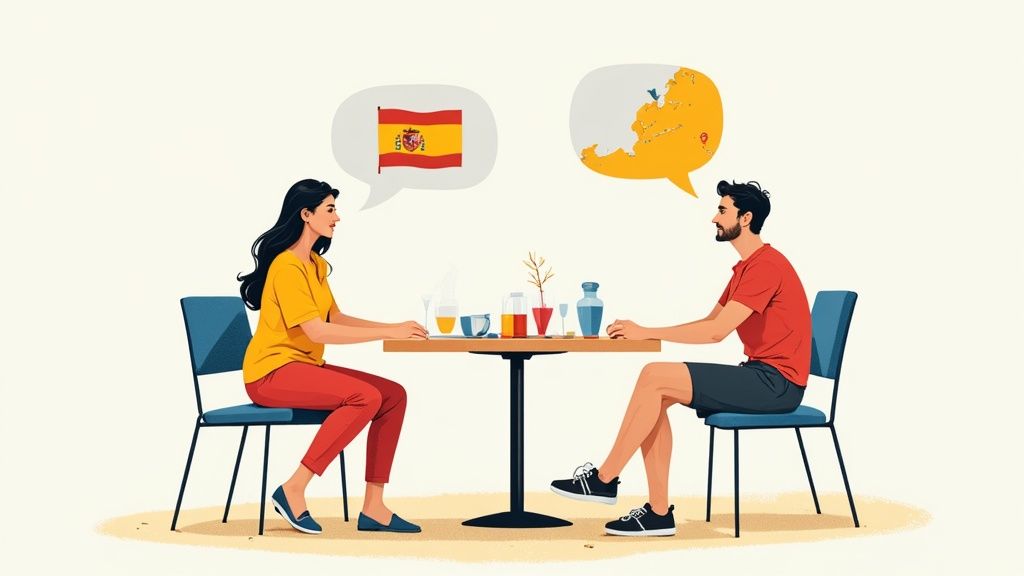
In a close-knit town like Jávea, who you know is often just as important as what you know. Digital job boards are a great starting point, but the real game-changers are your Spanish language skills and your local network.
These two things can transform you from just another CV in the pile into a familiar face that business owners genuinely want on their team. Mastering Spanish isn't just about being polite; it's a powerful tool that unlocks a huge number of opportunities and shows a level of commitment that employers here truly value.
Practical Steps To Improve Your Spanish
You don't need to be fluent overnight, but making a visible effort will immediately set you apart. Luckily, Jávea has plenty of ways to learn that go far beyond a textbook.
- Local Language Schools: Enrolling in a course at a local academy is a fantastic way to get some structured learning under your belt while meeting other newcomers.
- Language Exchanges (Intercambios): Keep an eye out for casual meetups in local cafés. It’s a relaxed way to practise your Spanish with native speakers who want to practise their English.
- Immersive Daily Practice: Small changes add up. Switch your phone’s language to Spanish, listen to Spanish radio in the car, and try ordering your morning coffee in Spanish. Every little bit really does help.
Building Your Network From The Ground Up
Networking in Jávea isn't about collecting business cards at formal events. It’s about building genuine relationships within the community. In a place this size, your reputation is your most valuable professional asset.
A casual chat with a barista, a friendly conversation with a shop owner, or striking up a conversation on the beach can lead to unexpected opportunities. People here are generally welcoming, and this personal approach is often how people hear about jobs in Jávea, Spain, long before they ever get advertised online.
Key Insight: In a small town, every connection matters. The person you chat with at the local market could be the owner of the restaurant that's about to start hiring for the summer season. Be friendly, be genuine, and be present in the community.
It’s also worth noting that the Spanish labour market is shifting. While overall hiring has dipped, there's been a noticeable move towards longer-term contracts over temporary ones. This means employers are increasingly looking for reliable candidates who plan to stick around.
Expanding Your Circle Beyond Jávea
Don't box yourself in. The Costa Blanca is a fluid region, and building connections in nearby towns like Moraira can seriously expand your opportunities. Moraira has its own bustling scene of restaurants, boutiques, and businesses that are often looking for great staff.
If you want to get a feel for the local vibe, our guide to discovering the culinary delights of Moraira is a great place to start.
Making the short trip to explore these neighbouring towns shows real initiative. While you're there, pop into local places, introduce yourself, and get a feel for the community. And if you ever find yourself in Moraira, please feel free to stop by our studio for a chat. We love meeting new people making this beautiful area their home.
Common Questions About Working in Jávea
Moving to a new country always throws up a ton of questions. To give you a clearer picture of what to expect, we’ve put together some straight answers to the most common queries we hear about finding jobs and working in Jávea.
Getting these details sorted early on can make a world of difference, helping you arrive on this beautiful stretch of the Costa Blanca feeling prepared and confident.
What Is a Realistic Salary for Hospitality Jobs in Jávea?
Let's talk numbers. Salaries in Jávea can vary quite a bit, but if you're looking at entry-level hospitality roles like waiting staff, particularly during the summer high season, you'll likely be looking at something around Spain's national minimum wage (Salario Mínimo Interprofesional).
As of early 2024, that figure was about €1,134 per month. It's also really common in Spain to be paid in 14 instalments instead of 12, with extra payments in the summer and at Christmas – something to bear in mind when budgeting. Naturally, more senior roles like experienced hotel managers or specialist chefs will earn significantly more.
One thing to always remember in tourism-facing roles is the role of tips. While they can definitely give your income a nice boost in busy bars and restaurants, they're never a guarantee. It's crucial to ask a potential employer whether a salary offer is bruto (before tax) or neto (what you actually take home). Getting that clarity upfront saves a lot of headaches later.
Can I Really Get a Job Without Speaking Spanish?
Honestly? It’s possible, but you’ll be fishing in a very small pond. The few jobs that don’t require Spanish are almost always in businesses catering exclusively to British or other Northern European expats – think certain estate agents or bars in heavily international areas.
Having even a basic, conversational level of Spanish will open up a massive number of doors. It's pretty much essential for any job that involves dealing with the public or local suppliers. More than that, employers see it as a sign that you’re committed to integrating and sticking around, which instantly makes you a more attractive candidate. Fluency is what truly unlocks the best year-round opportunities.
Is It Hard to Find Year-Round Work?
There's no denying it: Jávea’s job market is seasonal. A huge hiring wave kicks off around Easter and runs right through to October, especially for anything tourism-related. During these months, the demand is incredibly high.
But it’s not all just summer work. Thanks to a large and very active year-round community of both locals and expats, there’s a steady need for all kinds of services outside the main tourist season. You’ll find that permanent work is much easier to come by in sectors like:
- Property Management and Maintenance: Taking care of villas and apartments for owners who aren't in town.
- Skilled Trades: Good plumbers, electricians, builders, and gardeners are always in demand.
- Healthcare and Wellness: This sector serves the permanent resident community all year long.
- Everyday Retail: Shops and services that locals rely on, rather than just tourists.
If you’re aiming for a permanent position, the best strategy is to build a strong local network. Show you're reliable and that you’re here to be part of the community, not just for one sunny season. It’s also a great idea to make connections in neighbouring towns. While you're exploring the area, we’d love for you to pop into our studio in Moraira and say hello!
At Sueño Interiors, we specialise in turning houses into homes with our curated Mediterranean style. Whether you're furnishing a new property or redesigning a beloved space, our team in Moraira can help you create the perfect coastal retreat. Discover our collections and design services online.

